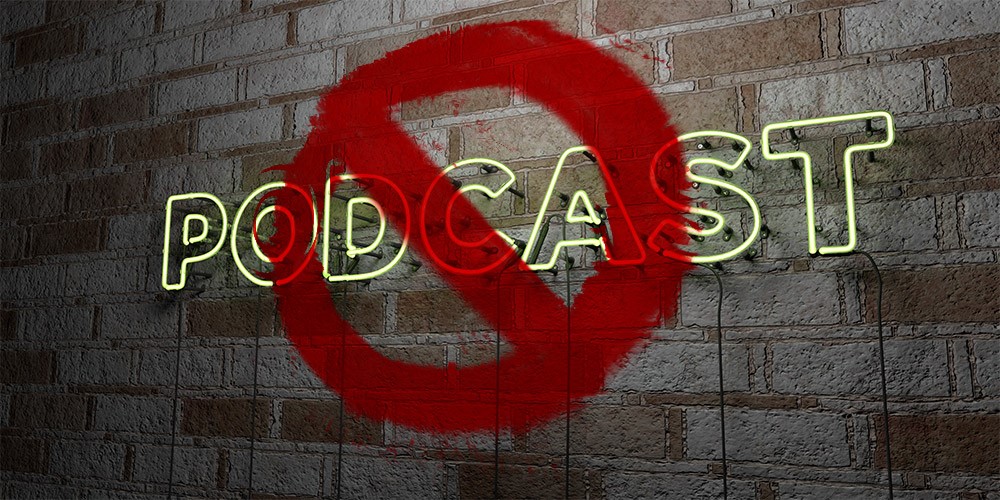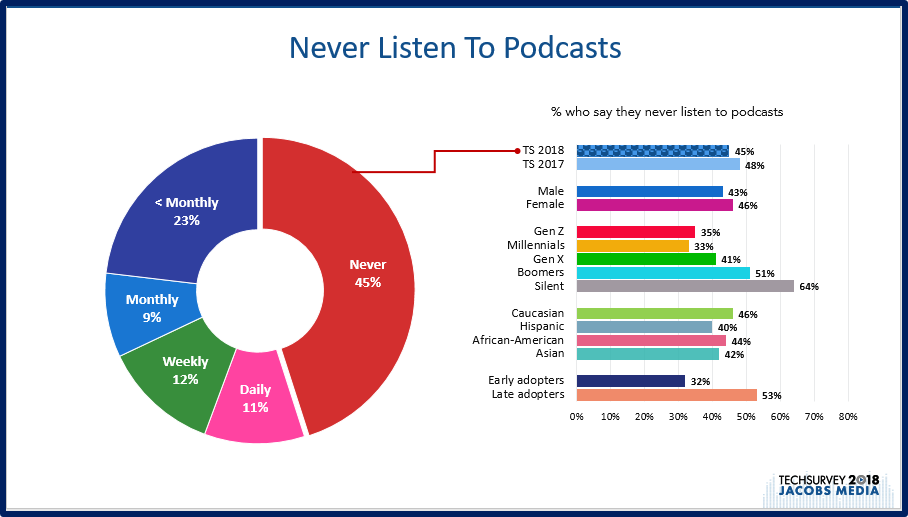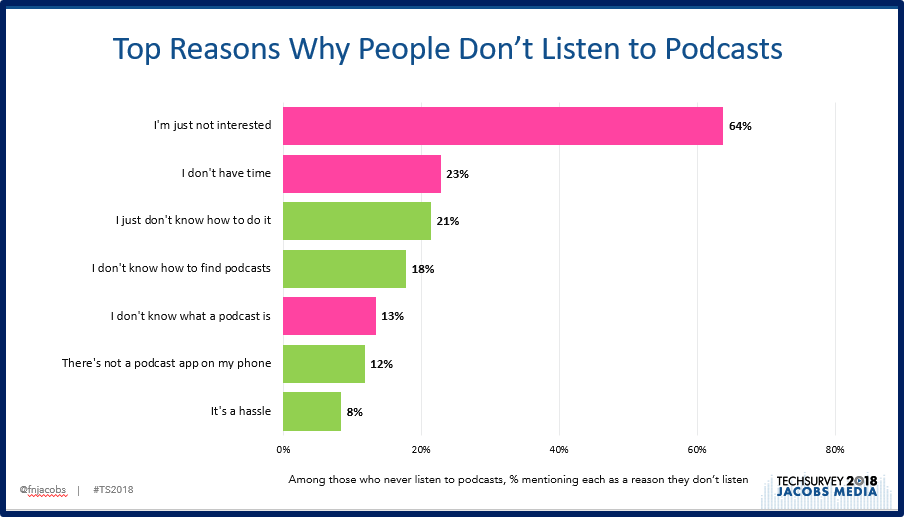
Like many studies of radio listeners and consumers in general all show, the trajectory for podcasts is heading north. But ever so slowly.
The good news is the money’s beginning to pour in. Earlier this week, the IAB (Interactive Advertising Bureau) reported a revenue increase of 86% for podcasts. That adds up to an estimated $314 million in 2017, up substantially from $169 million the year before.
Of course, that pales in comparison to commercial radio revenue, an estimated $13+ billion (yes, with a B).
Part of podcasting’s comparatively modest monetization picture is due to its incremental growth in overall usage. We see only gradual increases in podcast listening in our Techsurvey 2018 – but much more robust listenership in our Public Radio Techsurveys, where that audience is becoming more rapidly accustomed to on-demand, long-form audio content.
Still, a plurality of people in our newest TS2018 – a whopping 45% – say they “never” listen to podcasts.
Researchers usually focus on those already engaged in podcasting – who they are, what gadgets they use, how many podcasts do they listen to a week, and other such data points that we’ve now seen scores of time.
But today’s post takes a deep dive into all those people who just don’t engage with the audio on-demand groundswell – that large group who couldn’t be bothered with podcasts.
First, and foremost, here’s who they are:

The good news is these podcast avoiders are a smaller group than in our 2017 study. They lean male, and heavily into the Boomer and Silent generations. Notably, the most frequent podcast fans are Millennials.
Note also how a majority of tech late adopters also fall into this “podcasts never” group. That finding suggests there may be technical issues afoot that go a long way toward explaining why so many consumers know as much about podcasts as their nuclear physics.
To learn more about what’s taking so long, we asked this group to choose among a number of reasons to explain their lack of involvement in the medium:

A professed lack of interest and time lead the list of podcasting negatives. And they both strike us as code for simply not knowing enough about the space and what it offers.
But the green bars get down to the more practical problems with podcasting. The fact is, that for many people, the medium presents technical barriers to listening. A lack of knowledge about how to listen, where to search, and the overall hassle of finding and selecting on-demand audio options are key speed bumps. Audible’s Eric Nuzum has referred to the more than half a million podcasts as an audio “flea market” where it takes effort to rummage through it all to find quality content.
But there’s still another barrier, and it has to do with smartphones and apps. Techsurvey shows the smartphone is – by far – the gadget of choice for podcast listening. If you own an iPhone, it comes installed with a nifty, native Podcasts app that makes it relatively easy to access on-demand audio.
On the other hand, if you’re in the massive group of those who’ve opted for Android phones, you’re out of luck. That’s because Google has not yet developed the same sort of seamless app experience that’s been part of the iPhone arsenal these past several years.
But that may be changing. While still in the rumor stages, the site 9to5Google reports a Google Podcasts app may be in the offing. In fact, they say they’ve even uncovered a logo (right), with the  expectation the app will be in the Play Store soon.
expectation the app will be in the Play Store soon.
The term “game-changer” is overused in media and tech circles. But in the case of podcasting, many experts believe that a brainless Android app for podcasts is the missing link that will unleash much more interest in the medium.
Our Digital Dot Connector, Seth Resler, is one of them. He’s convinced that a seamless app search and access process on Android phones will make it easy for virtually all smartphone owners to enjoy everything from Pod Save America to Grammar Girl to the Dave & Chuck the Freak podcast.
When it becomes as easy to listen to on-demand audio – podcasts – as it is to watch on-demand video (Netflix, YouTube, Hulu), it’ll be a whole different ball game.
It’s just a matter of time.
Our two-day lineup at the Podcast Movement conference next month in Philly is virtually complete. And it’s loaded with a star-studded lineup of key players in both the podcasting and radio spaces. “Broadcasters Meets Podcasters” kicks off with the CEO of NPR, Jarl Mohn. It’s sponsored by Beasley Media Group. There’s still time to register for the event here.
- 5 Lessons For Radio From The Apple Watch - May 5, 2025
- DJs And Baristas: Can They Save Their Companies? - May 2, 2025
- Radio’s New Audience Equation: Z Over Y = Trouble - May 1, 2025




I think it’s true that ease of use is the most important determinant of success and growth. Second to that is a must-listen factor. “Serial” delivered a modest must-listen argument, and you could argue that the slow-and-steady audience growth of podcasting unfolded from that.
“I’m just not interested” sounds like code for “I haven’t experienced anything to awaken my interest.” Difficult access, and absence of the next blockbuster, probably combine into that.
Spot on, Brad. Thanks for taking the time to comment.
Great article, thank you. While an app might be useful in advancing the accessibility of podcasts, what I wish for is a physical appliance – like a table radio. Program it with your 20 or 50 faves, either directly or via some app. When I want to listen, I just turn it on, “tune” to my podcast “station” of choice, and away we go. Could either be an add on box like a ROKU, or a standalone device with a speaker, alarm clock, etc. Anyone working on this?
Loge, I think it might be named Alexa. 🙂
Fred, you were the Consultant at a couple of stations I worked at. Do you see the talent pool in radio drying up? I mean thanks to voice tracking saving radio money. I am currently doing my own podcast because radio won’t pay talent what it’s worth anymore. Thanks for the comment.
Hey, Arnie, nice to hear from you. You are right there are fewer “slots” for live talent – fewer dayparts, etc. That said, there’s still a very nice market out there for personality shows. Good luck with the podcast, but keeping looking for that show where you could bring value to a cast, like you did with RAD. Best to you.
Fred, isn’t a lot of this based on supply and demand? There could be an infinite number of podcasts on an infinite number of topics. For one to be successful, it has to be a topic of interest to a large body of listeners. It has to be FOUND and then it has to be listened to. Broadcast radio (or tv) is already there..and content is easy to “stumble on”. Podcasts (and many online services) are a little more involved, and harder to find. There’s a reason Netflix, Hulu and Amazon Prime use pictures to display the content available. Most podcasters don’t have the resources to do that-and sadly most wouldn’t be recognizable anyway. It only takes a few seconds to see “The Incredibles” or “Dirty Dancing” graphically to know what I’m going to get. You might have the greatest most entertaining podcast in the world-but unless someone knows it’s there-you’re shouting in a vacuum.
Dave, this issue of “podcast discoverability” is an ongoing debate. Many believe that if you have a great podcast, consumers will simply find it. I believe there’s more of that. And you’re correct that visuals (a photo, icon) assists familiarity in a fast-moving world of content. Thanks for the comment and observation.